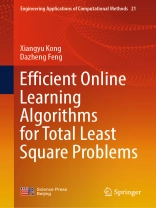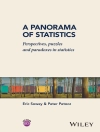This book reports the developments of the Total Least Square (TLS) algorithms for parameter estimation and adaptive filtering. Specifically, it introduces the authors’ latest achievements in the past 20 years, including the recursive TLS algorithms, the approximate inverse power iteration TLS algorithm, the neural based MCA algorithm, the neural based SVD algorithm, the neural based TLS algorithm, the TLS algorithms under non-Gaussian noises, performance analysis methods of TLS algorithms, etc. In order to faster the understanding and mastering of the new methods provided in this book for readers, before presenting each new method in each chapter, a specialized section is provided to review the closely related several basis models. Throughout the book, large of procedure of new methods are provided, and all new algorithms or methods proposed by us are tested and verified by numerical simulations or actual engineering applications. Readers will find illustrative demonstration examples on a range of industrial processes to study. Readers will find out the present deficiency and recent developments of the TLS parameter estimation fields, and learn from the the authors’ latest achievements or new methods around the practical industrial needs. In my opinion, this book can be assimilated by advanced undergraduates and graduate students, as well as statisticians, because of the new tools in data analysis, applied mathematics experts, because of the novel theories and techniques that we propose, engineers, above all for the applications in control, system identification, computer vision, and signal processing.
विषयसूची
Introduction.- Least Square Problems.- Total Least Square Methods.- Fast Recursive TLS Algorithms.- Approximate Inverse Power Iteration TLS Algorithm.- Neural Based MCA Algorithms for Adaptive TLS.- Neural-Based SVD Algorithms.- Neural based TLS Algorithms.- TLS Algorithm Under Non-Gaussian Noises.- Performance Analysis Methods of TLS Algorithms.
लेखक के बारे में
Xiangyu Kong was born in May 1967. He received the B.S. degree in optical engineering from Beijing Institute of Technology, P. R. China, in 1990, the M.S. degree in mechanical and electrical engineering from Xi’an Institute of Hi-Tech, in 2000, and the Ph.D. degree in automation science and engineering from Xi’an Jiaotong University, P. R. China, in 2005. He is currently a professor in the Department of Control Engineering of Xi’an Institute of Hi-Tech. His research interests include adaptive signal processing, neural networks and feature extraction, process monitoring, and fault diagnosis. He has published seven monographs (all as first author), including two English monographs published by Springer, and more than 150 papers, in which more than 40 articles were published in premier journals including IEEE Transactions on Signal Processing, IEEE Transactions on Neural Networks and Learning Systems, and Neural Networks. He has been PIs of four grants from the National Natural Science Foundation of China.
Da-Zheng Feng was born in December 1959. He received the Diploma degree from Xi’an University of Technology, Xi’an, China, in 1982, the M.S. degree from Xi’an Jiaotong University, Xi’an, China, in 1986, and the Ph.D. degree in electronic engineering from Xidian University, Xi’an, China, in 1995. From May 1996 to May 1998, he was a Postdoctoral Research Affiliate and an Associate Professor with Xi’an Jiaotong University, China. From May 1998 to June 2000, he was an Associate Professor with Xidian University. Since July 2000, he has been a Professor at Xidian University. His current research interests include signal processing, intelligence and brain information processing, and In SAR. He has published more than 150 journal papers, in which more than 60 articles were published in premier journal including IEEE Transactions on Signal Processing, IEEE Transactions on Neural Networks and Learning Systems, and Neural Networks. He has been Principle Investigator of six grants from the National Natural Science Foundation of China.












